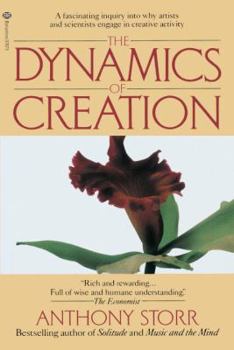The Dynamics of Creation
Select Format
Select Condition 
Book Overview
What drives the artist to create masterpieces and the scientist to forge breakthrough theories? This is the fundamental question that British psychiatrist Anthony Storr sets out to answer in The... This description may be from another edition of this product.
Format:Paperback
Language:English
ISBN:0345376730
ISBN13:9780345376732
Release Date:February 1993
Publisher:Ballantine Books
Length:346 Pages
Weight:0.74 lbs.
Dimensions:9.0" x 0.8" x 6.0"
Customer Reviews
4 ratings
A major psychological study
Published by Thriftbooks.com User , 19 years ago
In his study, Dr Storr investigates the urge which drives artists to produce works of art. Interestingly enough, an author like George Simenon stated that "Writing is not a profession but a vocation of unhappiness." For some artists, creating is a wish-fulfilment like for Frederik Rolfe who was a psychopathic personality and a paranoid and who was also querulous, egocentric, suspicious and misanthropic. Or James Bond, the character who was a wish-fulfilling fantasy of what Ian Flemming would like to have been. The desire for fame and honour is also a part of an artist's motivation. Some artists attach such enormous importance to their work that it can be considered as an addiction in which the creative activity is sometimes used as a defence. Many artists show a schizoid character: they are introverted, solitary people, preoccupied with inner rather than outer reality because they feel weak and vulnerable vis-à-vis others. Dr Storr mentions Franz Kafka, Charles Dickens, Bertrand Russel and Albert Einstein. Indeed, it is the capacity for extreme abstraction combined with a retention of contact with reality which makes creative achievement of a high order so remarkable. Had Isaac Newton not been anxious, insecure, hypochondriacal and self-disparaging with paranoid tendencies making him live in near total seclusion, he may never have achieved what he did. Some artists have a manic-depressive temperament and the opportunity to express themselves through art enables them to do so without the immediate need to fit in with the opinions of others. The artistic creation is thus an effective method of protecting the self from depression. Other artists like Rossini, Stravinski or Henrik Ibsen were obsessional characters - disgusted with bodily functions, parsimonious and miserly - so that their creative work was characterised by meticulous and extreme tidiness which reflects their compulsive need to order and control. Detachment from the object - "physical distance" - is a necessary condition for both artists and scientists and the capacity for abstraction gives the artist a sense of mastery over that from which he detaches himself. The fact that man carries with him throughout his life a discontent of the intrinsic frustration of his infancy leaves him with a "divine discontent" which may spur him on to creative achievement. The creative, especially those with a depressive psychopathology, readily identify themselves with others and they are very fearful of undue influence so that it is their very sensitivity to what others think which makes them avoid company. Furthermore, Dr Storr examines the relationship between genius and madness, that between creativity and the quest for identity and finally the creation as an act of integration. A very erudite work and yet very pleasantly written so that it is perfectly accessible even to the layman in psychology.
Storr, Freud, and Jung
Published by Thriftbooks.com User , 22 years ago
Storr not only clears up much of the misinformation surrounding creativity and madness, but once again proves himself to be a remarkably clear interpreter of both Freud and Jung.
The Dynamics of Creation
Published by Thriftbooks.com User , 23 years ago
Storr never fails to amaze me with the depth of his perceptions. He dicusses 'head-on' the kind of ideas that one has thought of before, but never persued. He manages to cover every view-point without obvious bias...I'd recommend this book to anyone interested in the reasons one is drawn to create, and the links between mental illness and creativity/madness and genius......
an excellent overview of the field of creativity research
Published by Thriftbooks.com User , 24 years ago
I wish this had been the first book I read for a semester of independent research on the relationship between creativity and mental illness- this is an extremely clear, comprehensive look at a variety of questions within the field. The only failure in this is Storr's habit of raising interesting questions and never answering them. Overall, an excellent read, borrowing much from Jung's idea of integration.






